Text
Q&A with Filmmaker Hersh Nat
ConnectHER communications specialist Elaine Robbins spoke with Hersh Nat, whose film Besharam was shortlisted as a finalist for Best Film Production at the ConnectHER Film Festival 2020. Hersh is a Punjabi artist who grew up in West Sydney, Australia.
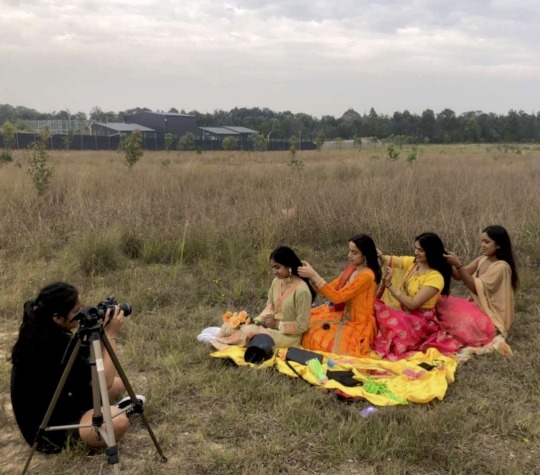
1. Why did you choose to make a film about cultural notions of beauty and how Indian women view themselves?
I chose to film young South Asian girls in Western Sydney because I wanted to cultivate a piece of art that told me that I was good enough. I have always struggled to find representation outside of Bollywood cinema, so naturally the story aligns with many communities globally. There is a strange rite of passage that takes place beneath Eurocentric influence and cultural assimilation in us first-generation kids. We end up formulating something new that is generally built from discrimination and self-hatred. In my experience, it took years of growth for me to stop feeling ashamed and become content in between my two worlds.
As a director, I wanted to educate others about the lives we as South Asian women endure and the misconceptions we face by presenting elegance within the vulnerability of our shame. I wanted to motivate other people of color to feel liberated in their experiences enough to reformulate them and be proud of them. Hence the name of my film, Besharam (Hindi for “shameless”), which refers to the act of loving oneself despite the conditioning that tells us we shouldn't.
2. Your film overlays images of young South Asian women posing in natural settings with the voices of young women talking about their experiences. Did you start with the conversation and the soundtrack, or did you start with the film shoot?
Initially I went into this film with ideas for the visual components. I wanted to capture the girls in an unfiltered way, which is why the shots are candid and raw. After the film shoots, I asked women in a focus group to elaborate on ideas of what beauty really is. “What makes an Indian girl beautiful?” was one of the questions I asked. This stirred a plethora of powerful emotions, as you hear in the voiceovers layered throughout the film. The women recounted discrimination and expressed their anger about how whitewashing had adversely impacted their self-image as young women of color. One woman said, “If you have dark skin with white features, you’re pretty. If you have dark skin with any type of ethnic features, you’re unattractive.”

3. It’s not surprising that your film was a finalist in the Best Film Production category. It is so visually striking, with women in colorful saris and flowing fabrics. How did you create your film's visual vocabulary?
I prioritized aesthetics and the physical presentation of the models. I knew initially that I wanted to have cultural garments that were playful and bright, because it looks beautiful on screen and indicates a discussion about cultural identity. This was translated by the girls “modernizing” their outfits. In the field shoot, I asked the girls to wear sneakers beneath their lehengas to display their child-like innocence and flourishing identities.
I only have basic experience with editing in post-production, so I poured most of my energy into filming the shots well. I was constantly trying to meet the girls at eye level so that the effect was intimate and real. All of the shoot locations were natural and calm, to express acceptance and comfort.
4. Was it a challenge to organize the location shoots?
Once I had a rough idea of the film I wanted to create, I reached out on Instagram to as many young South Asian girls as I could. The response was a little discouraging at first. But I stayed diligent and managed to have 20 girls confirm, which worked out perfectly. Thankfully all of the girls got themselves to the shoot location. My job was to grab a tripod, dupattas [head coverings] from my mum's closet, and several props like plastic dolls, hair brushes, and little mirrors.
Before the shoot, I worked on a mood board to map out the aesthetics, and I made directorial notes of different scenes I was going to try to create. The notes were really just starting points for me to map out how I was going to film things. It became apparent in the field that everything would not be how I had envisioned it. I felt more comfortable during the second shoot, as I had more experience. The whole experience was definitely a challenge, but I'm glad I took it.
5. Where have you shared your film?
I was fortunate to have my film screened in Western Sydney at a local youth center. This was such an achievement for me, because I feel that there is a lack of opportunities for creative young people in Western Sydney. Standing at the screening among a diverse group of people enjoying South Asian art and food, I felt like I had achieved something great! There was representation, which is vital to break stereotypes and encourage understanding of such communities.
6. What are your plans for the future? Any more film plans?
Besharam contained a multitude of ideas that I can see myself elaborating on in future projects, not just on film but in photography and writing. I also want to do social research to underpin the art so that I can make it more factual and powerful. I am particularly interested in capturing the stories of the younger generations of the cultural diaspora in countries like Australia. I think some of the most fascinating stories come from taboo topics, the things that people would rather sweep below the rug and leave unsaid.
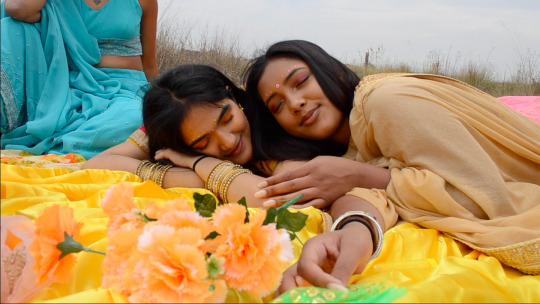
“I think some of the most fascinating stories come from taboo topics, the things that people would rather sweep below the rug and leave unsaid.”
7. You offered a brief vision in your film about what it would be like if women could accept themselves completely. Can you share it with our readers?
One woman in our focus groups said, “In the moments when you can feel completely comfortable in yourself, they’re so sacred and so rare. If we were to experience that more often, even all the time, things would just be a lot easier.” This discussion came about after I asked the question “How can we see our imperfections as beauty marks?” This is such a simple yet important idea that suggests a reality devoid of self-hatred, discrimination, and societal pressure. Although we may never attain complete self-acceptance, I believe it is important to speculate on what we all truly desire. It is only after we unpack the pain of our experiences that we can find solutions, which are grounded by acceptance and mutual understanding.
“It is only after we unpack the pain of our experiences that we can find solutions, which are grounded by acceptance and mutual understanding.”
0 notes
Text
6 Inspiring Memoirs
By Elaine Robbins
Have time on your hands while you are social distancing? Here’s what I’m reading right now: Melinda Gates’s The Moment of Lift: How Empowering Women Changes the World. The author shares stories from her own life and those of women she meets around the world as she seeks solutions that will improve the lives of women. She shows us how to listen to women with humility and respect if we want to tackle a host of global poverty problems, from family planning to improving farm yields.

Also check out these five autobiographies by some of ConnectHER’s project partners and speakers:
Proud: My Fight for an Unlikely American Dream, by Ibtihaj Muhammad
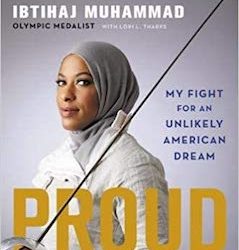
Muhammad, keynote speaker at ConnectHER’s Film Festival 2019, gained global media attention in 2016 when she became the first Olympic athlete to compete in a hijab for Team USA. In this memoir, she tells how she overcame prejudice and naysayers throughout her life and went on to win Olympic glory.
Beautiful Justice: Reclaiming My Worth After Human Trafficking and Sexual Abuse, by Brooke Axtell
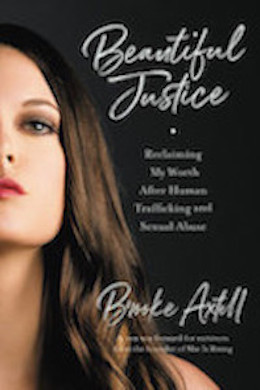
This harrowing tale of one woman’s recovery from child sex trafficking provides a hopeful roadmap for survivors and their allies. For Axtell, music and creativity offered a lifeline. You can help other survivors reclaim their lives by supporting her organization She Is Rising here.
I Should Have Honor, by Khalida Brohi

At age 16, Khalida Brohi witnessed the death of a beloved cousin in an "honor killing." That tragic event led her to found Sughar, a nonprofit that provides women’s livelihood training across Pakistan. This memoir recounts how Brohi grew up in a tribal area, got educated against the odds, and gained the courage to empower other women. You can support Sughar’s work here.
A Woman of Firsts, by Edna Adan

The former first lady and first female cabinet minister of Somaliland has saved the lives of countless babies and mothers at her Edna Adan maternity hospital. In the process, she has trained many young women in Somaliland for careers as midwives. You can order the book here and support Edna’s work through several ConnectHER projects here.
Cowgirl Power: How to Kick Ass in Business and Life, by Gay Gaddis

Gay Gaddis, the founder of T3, one of the nation’s largest woman-owned advertising companies, tells readers how to harness their inner cowgirl. Her own story, interweaved with the stories of real-life cowgirls, shows us how to lasso our grit and determination to get what we want in life.
Support your local bookstore during this challenging time! Many bookstores offer deliveries and curbside service, or you can order local through IndieBound here.
0 notes
Text
A message from ConnectHER


By Jyarland Daniels and Lila Igram
We inspire others when we tell our stories, however, stories don’t just inspire. Stories are catalysts for change because they help people see what is possible; it reminds them of the resilience of the human spirit, even in the most difficult circumstances. The ConnectHER Film Festival is proud to provide a platform for young people to tell their authentic stories about issues pertaining to women and girls.
The power of film to emotionally move us is unparalleled. Film can also be a tool to dismantle widespread oppression, structural racism, and inequality that is rampant in our world. At ConnectHER, we believe that Black Lives Matter is more than a phrase—Black women and Black stories are important for everyone to hear. They are important yesterday, today, and tomorrow.
We, at ConnectHER Film Festival, are honored that young Black women all over the world choose our platform to tell their stories with passion and courage. In some cases, these films are made with a camera phone and on a shoestring budget—yet these women speak to us. We hear their voices. We are inspired. We believe you will be, too. Here are some of their submissions to the festival:
1) The Skin Tone Rule
This film conveys the journey of a young girl who notices she looks different from her White classmates, feels “less than,” and finally learns to feel at home in her own skin.
2) Make Me Divine
This short film explores society’s flawed beauty standards for young Black girls.
3) Cut
At age 15, this Guinean filmmaker discovered every woman in her family had undergone female genital mutilation.
4) Pitit Soley (Child of the Sun)
Colorism, discrimination and prejudice based on skin color by members of the same race, is harmful to people across the world. The filmmaker interviews girls in Haiti about the cultural messages they hear about dark skin and what more positive messages they would like to share.
5) Women in Tech
When you think of a computer programmer, do you think of a young White dude? You’ll think again when you meet these Nigerian women who are rewriting the rules for women in tech.
6) Rural To Ramp
The tradition of handmade crafts in African cultures is more than a pastime -- it is a way of life. This fair-trade handicrafts venture provides much-needed income streams which allows rural women to achieve social and economic empowerment.
8) Not Your Bride: A Woman’s Constitution
Once a child bride, a girl in Zimbabwe takes on the issue of child marriage and wins her case. One girl changed the lives of women in an entire country.
9) Overdue
This short film focuses on the dynamics of dating violence and its effects on the victim.
10) Bvudzi: A Hair Affair
BVUDZI, which translates to “hair” in Shona, explores the story of a young Black woman whose femininity has been largely defined by the length and texture of her hair.
11) Love You Forever
In this coming-of-age story, a daughter reminisces about her relationship with her mother who suffers from depression.
12) Teach Her
Adding more stories about women scientists and engineers to school curriculum will encourage girls to pursue STEM careers.
13) A Film for Gugu
This is a story about a girl who overcame incredible obstacles as an undocumented person living in South Africa. Education saved her, and she believes it can save many other girls as well.
14) Behind Closed Doors
This documentary raises awareness about commercial sexual exploitation in the United States and introduces solutions to end it.
15) Dignity: The Displaced Women of Oakland
Gentrification in Oakland, California, is pushing many longtime residents, including Black women, into homelessness.
Learn more about ConnectHER and our film festival here: https://www.connecther.org/
0 notes
Text
Filmmaker Spotlight: Q&A with Muhammad Waseem
Muhammad Waseem is a journalism and mass communication student from Khyber Pakhtunkhwa, Pakistan. His film The Chain Breaker won the Standup Man Award at the ConnectHER Film Festival 2020. The film tells the true story of a schoolteacher who broke with local tradition to pursue an inheritance rights legal case on behalf of his mother.

Edited by Elaine Robbins
1. Your film highlights the challenge that many women in Pakistan still face, even though a women's property rights bill was passed in 2019. What kinds of obstacles do they encounter?
First, even though laws have been passed to protect women’s property inheritance rights, the majority of women in the Khyber Pakhtunkhwa region are illiterate and therefore don’t know their rights. Second, women aren’t supposed to leave their homes unless they are accompanied by a male relative, so it is difficult for them to go to the courts or to visit relatives to advocate for their rights. The prolonged and complex legal process and hefty legal expenses also make it impossible for most women to pursue their claims. Finally, because women are dependent on men for financial support, and because they are often ostracized by their relatives if they pursue their cases, they are reluctant to go forward with their claims.
2. Your film focuses on a man's battle to help his mother claim her rightful land inheritance. Is it important that men like Sameer Ahmed be champions of women's rights?
Of course, women should be able to stand up for their own rights. But we also need more men like Sameer to stand up for women’s rights, to set an example for the rest of society. In a male-dominated society, though, that is a tough and risky job.
3. What kind of media attention has your film received?
The story of my film winning an award at ConnectHER’s Film Festival appeared in two international news outlets, four national media outlets, and on a regional radio station. One of my teachers, who is a freelance journalist, interviewed me and wrote a story for Arab News. The headline read: “Short film by KP student takes on patriarchy, wins international prize.” I think it was the first time that the women’s inheritance rights issue has been covered in the news here.
“Short film by KP student takes on patriarchy, wins international prize.”
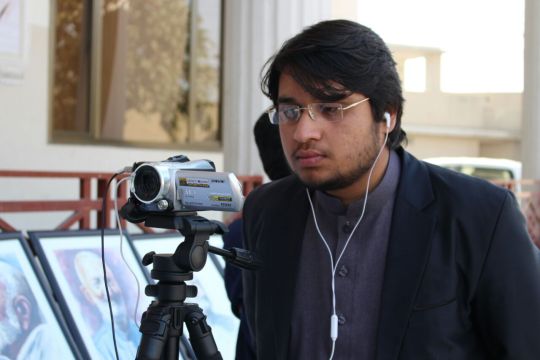
4. What kind of impact do you think this will have on protecting women's land rights in your country?
I personally know some people, both men and women, who learned about their inheritance rights through media coverage of my film. They were angry that, for example, their sisters didn’t receive their shares of their father’s property. I believe this will have a huge impact in the future as well.
5. What challenges did you face in making this film?
Although I have a passion for documentary filmmaking, I never received any training. My limited equipment was also a challenge. I only have two handycams, and one has a broken LCD. The other challenge was finding a subject to interview. I met with some lawyers who warned that I would never get a female from this region to sit in front of a camera in this region. I continued to search, and finally one of my film’s team members, Asif Ali, found Sameer’s case study. After several meetings, we convinced him to do an interview. In the face of these challenges, I am so happy to have won this award! I will remember it for the rest of my career.
“I know some people, both men and women, who learned about their inheritance rights through media coverage of my film.”
6. What made you become a standup man—a champion of women's rights?
I see that here in Pakistan, women are deprived of their rights. They are not permitted to get an education. My mother has been struggling with her brothers for more than 10 years to get her share of her father’s inheritance. So the women’s inheritance rights issue that I cover in The Chain Breaker is very personal to me.

0 notes
Text
GOOD READS
At the 2019 Olympic Games in Rio, Ibtihaj Muhammad made history as the first Muslim American woman in hijab to compete for the United States. In this excerpt from her autobiography, she talks about her time in the limelight when she was thrust her into a new role: sports ambassador.
Proud is dedicated “To anyone who has ever been told they don’t belong. When you let your light shine, illuminates everyone around you.”
Adapted from PROUD: My Fight for an Unlikely American Dream by Ibtihaj Muhammad. Copyright © 2018. Available from Hachette Books, an imprint of Hachette Book Group, Inc.
One of the most exciting things that happened to me post–Rio Games was that the Mattel toy company decided to make an Ibtihaj Muhammad Barbie doll. The best part, the doll would come dressed in a fencing uniform with a hijab. Like me, she would be a first, the first Barbie in a hijab.
When the company showed me the prototype, I cried. Considering how much I had loved my Barbies as a child, the thought of little girls, both Muslim and non-Muslim, playing with a Barbie who chooses to wear hijab made me so happy. As I sat there in the conference room at Mattel, my mascara running from my tears, I tried to explain why this doll was going to be so important to so many little girls.
“Not only does it give millions of little girls a doll that looks like them, it means you see us and that we matter,” I said, trying to regain my composure. The Mattel executives may not have understood just how significant this was to me, but that didn’t matter.
Soon enough, the world would have its first Muslim Barbie.
The Ibtihaj Muhammad Barbie made her official debut at Glamour magazine’s Women of the Year Summit and awards show in New York... The immediate response to Barbie at the Glamour WOTY Awards was positive and the support and love for the first Barbie in hijab was overwhelming. I walked away from the event that night even more inspired to do more, more committed to standing up, and more determined to raise my voice.
If I’ve learned anything from this amazing journey I’ve been on, it’s that the work never stops. The work ethic I developed as an Olympic athlete is the same one I’m calling on now as a change agent in a world that still hasn’t figured out how to make room for everyone, regardless of their race, religion, or gender. Just as I defied the odds to make it to the Olympics in a sport that didn’t have a place for me, I will continue to fight—to use all of my resources—for equality, justice, and peace. And I know this path I’ve chosen isn’t going to be easy—the odds are against an African-American, Muslim woman being embraced as a spokesperson for building a better America—
But easy has never been the way I roll.
I’ve had to fight for every win, every place at the table, every ounce of respect on my path to world-class athlete. And I will continue to fight because the prize this time is an America that truly respects all of its citizens. And that is worth more than any medal.
0 notes
Text
GOOD READS
After graduating from college, Ibtihaj Muhammad hit a low point in her life. She still applied for jobs, but the phone had stopped ringing. She took a job at the Dollar Store and started fencing again because it was one area of her life where she felt in control. That’s when she met a coach who believed in her talent—and gave her encouragement she needed to lead her to Olympic glory.
Adapted from PROUD: My Fight for an Unlikely American Dream by Ibtihaj Muhammad. Copyright © 2018. Available from Hachette Books, an imprint of Hachette Book Group, Inc.
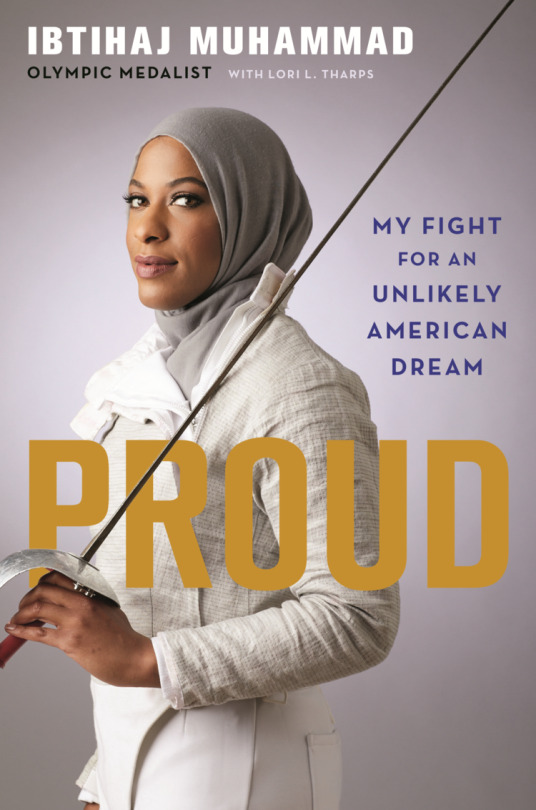
Coach Mustilli stared at me expectantly.
“What can I do for you, Ibtihaj?” he finally asked.
I wanted to say, Can you help me makes sense of my life?
Instead I settled for, “Do you think you could give me a lesson?”…
Part of me felt like I was wasting the coach’s time with my request for a lesson, but I pushed those feelings aside, because I needed to be in this safe space again.
We set up on strip number one—there were twelve different strips on the floor—and Coach took me back through all of my best high school moves. It felt like coming home. I easily parried and lunged and landed the most fluid attacks on my former coach.
Thirty minutes later, Coach Mustilli was panting, but I was just getting warmed up.
“Coach,” I said half laughing but still serious, “can you give me a harder lesson?”
Coach raised his thick, bushy eyebrows. “Okay, Ibtihaj, let’s see what you’ve got,” he said. And then he let me have it. It was the first time Coach Mustilli treated me like an equal opponent.
He didn’t hold back. He ran me up and down the strip, giving me the hardest lesson I’d ever had. I met him lunge for lunge, attack for attack. I was quick on my toes, and my saber sliced through the air. The sounds of our blades clashing and an occasional roar filled the room. I could feel the electricity coursing through the air like I was coming alive for the first time in months, and I loved it. I was in control, and no one could take that feeling away.
Finally, Coach Mustilli yelled, “Time!” We were both out of breath now. I took off my mask, taking in big gulps of air, and smiled at Coach Mustilli. “That was awesome, Coach.”
He walked slowly off the strip and over to the tables. He got two bottles of water from his cooler and beckoned me over to sit down. The sweat was pouring off his face now, and his black hair, now lightly streaked with gray, was plastered across his forehead.
He took a healthy swig of water before asking, “Ibtihaj, what are you doing here? What do you really want?”
I was unprepared for this question. What did I want?
“What I saw out there,” Coach continued, still trying to catch his breath, “was something I didn’t know you had.”
My eyes grew wide in surprise. “Really. You think I still have talent?”
“Talent? Ibti, I don’t think you’ve even hit your peak yet. I think if you want to go all the way with fencing you can.”
I couldn’t believe what I was hearing. No one had ever said this to me before. Not at Duke and not even at the foundation. And I never really imagined anything beyond college fencing.
“What do you mean go all the way, Coach?” I asked nervously.
“I mean that you should think about competing on the international circuit and maybe even think about the Olympics,” Coach Mustilli said. “I’m serious. I saw something out there today that I honestly didn’t know you had.”
I beamed from inside and out. After all of the recent rejections, this assessment of my potential ignited a spark that I thought had long since been extinguished.
“Don’t thank me, Ibti,” Coach Mustilli said with a warning in his tone. “If you decide to actually take up the challenge, it won’t be easy. In fact, it’ll be the hardest thing you’ll probably ever do. Being a champion is a long, lonely road. You’ll have to get up every morning hungry, and you can’t go to bed until you’ve exhausted yourself. Every single day. And there won’t be anyone on this path with you. It’s you, and that’s it.”
Even though I trusted Coach Mustilli with all of my fencing aspirations, I didn’t think he wanted to hear about the existential life crisis I was currently living in, questioning my very purpose in the world. I didn’t think he needed to hear that his words were literally feeding my soul at that moment.
“Do you think you can do it?” Coach Mustilli asked, interrupting
the jumble of thoughts and emotions running through my mind. But what I heard then in his question wasn’t could I handle the hard work as a full-time athlete? What I heard was would you like some purpose in your life again?
“Yes. I’m up for it,” I said to Coach Mustilli, quietly at first, and then I repeated it again to convince the coach, but also myself.
“Okay, Ibti,” Coach Mustilli said with a smile, “if there’s anyone I know who has the strength and determination to do this, it’s you.”
“Thanks, Coach,” I said, returning his smile.
“Don’t thank me, Ibtihaj, until you win. Until then, your life is going to be harder than it’s ever been before.”
0 notes
Text
GOOD READS
We all love to hear about winners, but we don’t often hear about the major setbacks that every successful person faces along the way.
Ibtihaj Muhammad knows all about those. Before she became an Olympic athlete and one of Time magazine’s 100 Most Influential People in the world, she spent her life battling stereotypes and naysayers as formidable as any opponent on the fencing strip.
Here she writes about a low point in her life after she graduated college and couldn’t find a job. The demoralizing experience led her back to the gym to fence because it was one place where at least she felt in control of her life.
Adapted from PROUD: My Fight for an Unlikely American Dream by Ibtihaj Muhammad. Copyright © 2018. Available from Hachette Books, an imprint of Hachette Book Group, Inc.
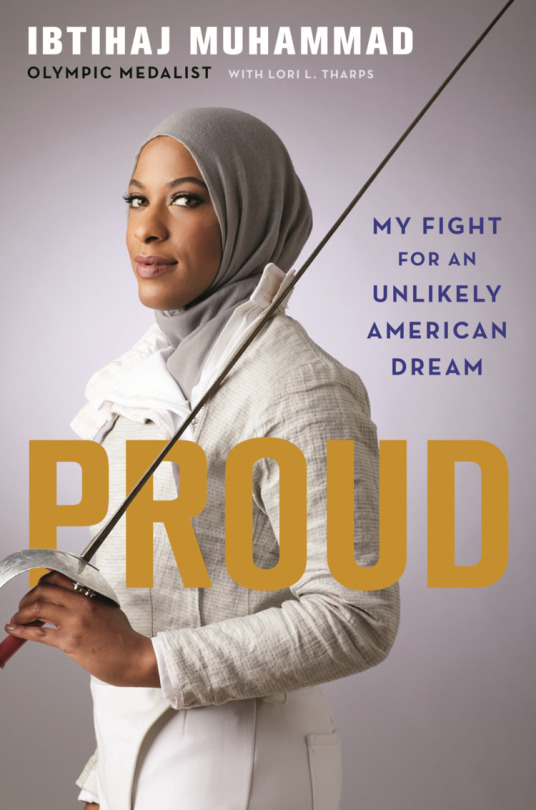
For three months after graduating, between studying for the LSAT, I had dutifully sent off dozens of résumés and applied for jobs at law firms and major corporations in New York and New Jersey that seemed like a good fit. The summer before graduation I’d completed an internship at a money management firm in New York, so I added financial institutions to my list, too. So far, I wasn’t having any luck, though. No one was even calling me back. Most of my friends were in grad school or had found great jobs already, working at prestigious firms like Goldman Sachs and Morgan Stanley. But not me. Everyone said it wasn’t my fault; it was the economy. We were in the Great Recession. College students couldn’t find jobs, and thousands of people were being laid off from long-term careers. While I knew this was all true, it didn’t make me feel any better. I simply wanted my life to start already.
…A tall blond man who looked to be in his mid-thirties came through the glass doors into the reception area where I was waiting. He wore crisp khaki pants, a light blue oxford shirt, and a navy-blue tie and blazer. He might as well have stepped out of a Brooks Brothers catalog. Except for his designer glasses and brown leather Italian loafers, he oozed corporate respectability. He walked right over to me and held out his hand….
He led me to his corner office with views that showed off the impressive New York City skyline. He gestured to the seat in front of his desk, and we both sat down.
“So, Ms. Muhammad,” Craig said, “tell me a little bit about yourself.”
…I highlighted my academic achievements and my success in fencing. I emphasized my ability to work independently, that I was a self-starter and had excellent time management skills. I finished talking about my desire to work in international law and how a job at this firm would be the perfect gateway into that field. I told Craig how I’d studied Arabic at Duke and in Morocco.
“That’s all impressive,” Craig said. “And I have to say you have a lot of the skills and attributes that we’re looking for in our paralegal candidates.”
“Thank you,” I said, smiling. I tried not to sound too excited, but inside I was feeling very confident….
He paused and cleared his throat before continuing. “I’m just wondering if there would be any conflict with your, um, lifestyle choices that might interfere with the work we do here.”
I didn’t know how to respond. It was illegal for an employer to ask someone about their religion in a job interview. My religion was evident in my name and it sat obviously covering my head, so I knew Craig was referring to my religion. But I didn’t understand what he was trying to get at circuitously.
“I’m sorry, I don’t know what you mean,” I said.
“Well, I’m just thinking that there are certain things about your, um, lifestyle that would prevent you from giving one hundred percent here in the office.”
Now I was really confused and, honestly, I was angered, too….
“Mr. Finch,” I said in a reassuring tone, “I have lived and worked and gone to school with non-Muslim people my whole life. I don’t feel uncomfortable in those situations.”
“Right,” he said, nodding, but I could tell he didn’t believe me. Actually, he probably wasn’t worried that I’d be uncomfortable,
I’m sure he was thinking that his other employees would be uncomfortable around me.
After that, Craig Finch asked me more banal questions, like where I lived in New Jersey and what my favorite class at Duke had been and why. I knew my answers didn’t matter. It was obvious that he only saw my hijab, not me. I continued to answer his questions and kept a smile on my face, but I knew the interview was over. As we walked back to the elevator, I knew that would be the last time I ever saw Craig Finch, and it was….
Tomorrow we’ll see how, after a low period that followed—a time when she wondered what her purpose in life was—Ibtihaj discovered her true calling.
0 notes
Text
5 Tips to Finish Your Girls Impact the World Film Festival Project!
By Elaine Robbins
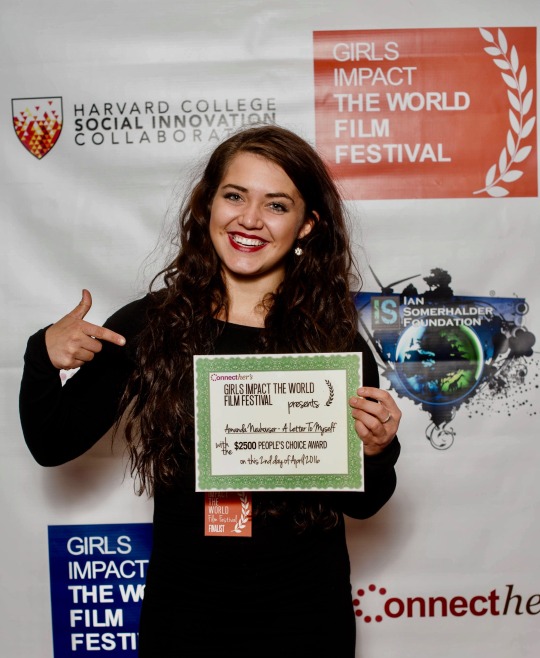
Do you have a film you want to submit to the Girls Impact the World Film Festival….but you’re not sure how you’re going to get it done? Are you losing confidence in your vision? Think you’ve taken on more than you can handle?
Hey, we’ve all been there. Every project worth doing has the inevitable hurdles, both creative and technical. But with 30 days till the GITW 2020 deadline, we want to cheer you on! Here are 5 easy tips to help you cross the finish line.
1. Set small, achievable goals. To avoid overwhelm, break your project into smaller increments. Cut one scene, finish the titles, pick music for the soundtrack. You may even want to set a timer for, say, 30-minute task sessions. Setting mini-goals makes it easier to tackle a big project, one step at a time.
2. Reward yourself. After you finish a goal, take a break and do something nice. Take a walk in nature, meet a friend for dinner, dance to your favorite music.
3. Get help! Find a friend or classmate to help with your project. Or simply ask them to sit with you and offer encouragement while you work. (Later you can return the favor.) We are always surprised how much better our work goes with a little support.

4. Keep your commitment to yourself. It is so satisfying to make something that you wanted to make, especially if it was hard to make. We want you to enjoy that feeling! When your film is done, sure, you’ll have a great piece for your portfolio. Even better, you’ll carry to your next endeavor the knowledge that you can overcome challenges and achieve your dreams.
5. Picture the glory! You’ve come this far—don’t stop now! Imagine winning a Girls Impact the World Film Festival scholarship award. And picture yourself at the Red Carpet Awards Ceremony this spring, accepting your award from Hollywood producer Elizabeth Avellan (below). Next stop, the Oscars!
Let us know how you’re doing with your film. Feel free to leave comments below.

0 notes
Text
Filmmaker Spotlight: Q&A with Jessica Mabanglo
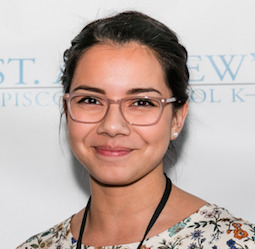

Jessica Mabanglo’s film Talk Up the Talk won the People’s Choice Award at Girls Impact the World Film Festival 2018. The film advocates having “the talk” so that students get useful information about bodies and sexual health. Jes is a communications arts major at Gordon College in Massachusetts, where she can be seen lugging equipment all over campus in her role as videographer for departmental programs.
Audiences loved your film Talk Up the Talk, obviously, since it won the People’s Choice Award. Where have you showed the film, and how are audiences responding?
I showed it at a film showcase event at my college, and it won for its category. I go to a small, conservative, Christian college, so you can imagine that sexual health is not a topic that comes up often. However, after the event, and in the weeks to follow, probably about 20 students and professors came up to me to thank me for showing the film. It started conversations in dorms and sparked discussions among students. They talked about how we should be open about the fact that all of us mature and most of us will experience intimate physical relationships, and we should know how to be safe and healthy in them. A faculty member reached out to me and asked if it could be a part of our “Holistic Heath Week” at the college. They used the film to introduce a health class where students could feel free to ask questions about sexual health (and even learn how to use protection—which is a very taboo subject at this school!).
Did your experience attending the Girls Impact the World Film Festival Awards and Red Carpet Event impact you in any way?
I heard stories of suffering that break my heart. That night after the festival, I went to my hotel and just cried. There is ugly evil in the world, and as a Christian filmmaker, how am I supposed to respond to that? Look at the good? Try to give others hope? Make up some biblical reasoning for suffering? Honestly, no—not always. Sometimes you just need to sit in a dark room full of people and all cry at the same screen.
And yet there was so much hope that night. Not to get all religious-y, but I’ve heard it said that if Jesus was on earth today, he would be a filmmaker. I think that storytelling’s purpose is to connect others in a world of suffering. Film was created to represent those stories, and I think it's an excellent way to break hearts, plant seeds, and re-instill the idea that we can change the world. Girls Impact the World empowers us to believe that we can make that change.
“Film is an excellent way to break hearts, plant seeds, and re-instill the idea that we can change the world. Girls Impact the World empowers us to believe that we can make that change.”
What are you working on currently?
I do freelance film work around campus. I am almost finished with a film called Object in Motion,about a young woman in a verbally abusive relationship. This one is close to home, because some of the script came straight from conversations with friends and from my own life. I intend to enter the film in GITWFF this year.
I am writing a lot, about everything and nothing, as I advise all aspiring filmmakers to do. I’m working on a musical and a series of children's books, neither of which I have any experience doing! I graduate in May, and I will finish my undergrad career doing an internship and taking classes in LA.
What are your career aspirations?
Since I am a fan of dreaming the ridiculous, I want to be a script supervisor for film or TV or work as a writer at Netflix. I’d like to be photographed collaborating with other creatives around a table, eating a donut, and being so immersed in my work that someday my kids will look at the photo and say, “Dang, Mom was a happy lady.”
But as much as I would love the thrill of being big in film, I think I’m the kind of person who will always be asking: “Is this where I am supposed to be?” “Am I doing enough?” What if my version of changing the world is actually helping immigration families travel safely as they seek asylum? What if I am called to go to the frontlines to help get children out of sex trafficking?
I want to be someone that knows how to turn the camera off when I need to. Knows how to sit down and verbally tell someone “I see you.” Capturing the story is, of course, necessary and powerful. But it’s the connection part that I aspire to.
“I’d like to be photographed collaborating with other creatives around a table, eating a donut, and being so immersed in my work that someday my kids will look at the photo and say, ‘Dang, Mom was a happy lady.’”
0 notes
Text
What Makes These Men So Irresistible?
We asked 4 of our favorite standup men why they support women’s rights.
1. How do we love Ian Somerhalder? Let us count the ways. He’s that rare and precious species: a male Hollywood actor who champions women’s causes. He speaks out about things that matter, from domestic violence to animal rights, in his media interviews and on social media. And since 2015 he has supported our Girls Impact the World Film Festival as sponsor of the Green IS Environmental Film Award and a champion of our young filmmakers.

“We need to celebrate the women not just in Hollywood but in technology, science, education, and our local communities. Let's celebrate the women achieving the unthinkable in our local communities every day.” —Ian Somerhalder
2. John Paul DeJoria is not only a brilliant businessman and philanthropist, he’s smart enough to surround himself with fabulous, powerful women. His beautiful wife, Eloise DeJoria, devotes her financial support as well as her time and heart to the Girls Impact the World Film Festival. The festival provides a powerful platform for young filmmakers to tell stories about issues that impact women and girls around the world.

“I have seen so many unnecessary hardships that many girls and women have gone through. We have to take care of one another and stand up for one another. We are all part of the human race. All the women in my life inspire me to do this—my mother, my daughters, my wife Eloise, my foundation director Constance.” —John Paul DeJoria
3. Human Act founder Djaffar Shalchi wants to end poverty, and he knows that you can’t do that without empowering women. That's why he supports the Girls Impact the World Festival, which turns students into filmmakers and activists for women’s issues. And why he funds the Afghan Institute for Learning's legal clinic in Afghanistan, which provides legal assistance to women in cases involving abuse, child marriage, child custody, and property rights.

“I support women because I want to move humanity forward with the power of love. If we are to achieve the UN Sustainable Development Goals, from ending poverty to improving access to education and clean water, we can’t afford to leave women behind.” —Djaffar Shalchi
4. The secret is out: Meet the man behind the plan, Tarik Aossey. Tarik works in a wide range of business and technology roles, but we love him because he encouraged his wife, Lila Igram, to follow her passion and launch ConnectHER and the Girls Impact the World Film Festival. When the going gets tough, Tarik is there to offer encouragement and support, both emotional and financial. Now that’s what we call a standup man!

“Standing up for women's rights and equality is the right thing to do for everyone. When women occupy key leadership positions, are paid equitably for their contributions, and have equal opportunity for advancement and success, it is better for kids, families, communities, and the world.” —Tarik Aossey
0 notes
Text
How to Have a Kickass Career: 4 Things I Learned at the Girls Impact the World Film Festival

By Elaine Robbins
1. Give your creativity room to play. Gay Gaddis, who runs one of the country’s largest women-owned advertising companies, shared how she encourages creativity at her agency, T3: “Do not stifle creativity. Because sometimes that crazy, nutty idea that was thrown up on the wall you go back to and say, ‘Wait, that’s it, let’s make this work.’ No idea is bad to start with. It’s all about putting it out there.”

2. Work hard. When people meet Olympic fencer Ibtihaj Muhammad, keynote speaker at Girls Impact the World Film Festival 2019, they want to know what it’s like to win an Olympic medal. But she also talks about the years of singleminded focus and hard work that it takes to qualify for the U.S. Olympic Team. “You don’t have time for anything but your path,” she says. “I had zero social life.”
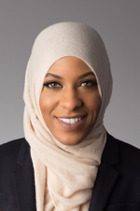
“Don’t let anyone get between you and your ambitions,” added panelist Edna Adan, who succeeded against the odds to build the Edna Adan maternity hospital inher native Somaliland, a country with one of the highest rates of maternity mortality in the world.“Do it with your heart. Do it with determination. Learn from your experiences. Do it in a way that you can start something and finish it.”
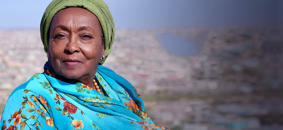
3. Focus on your strengths, not your weaknesses. “Focus on your strengths,” advised Umaimah Mendhro, the founder and CEO of VIDA, which connects designers and makers to create original quality apparel and accessories. “Women tend to be more self-critical than men are. Try to connect with yourself at that true level and understand what your true strengths are.”
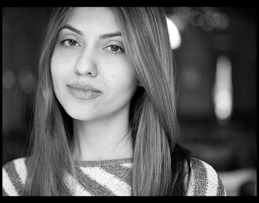
Added Gaddis: “Don’t beat up on yourself about your weaknesses….Focus on the things you do well, and the things you’re passionate about, and success will follow you.”
4. Let the naysayers fuel your determination. “I’ve always been really motivated by people who don’t expect things of me or who don’t believe I can achieve something,” said Muhammad, who has overcome naysayers, including coaches who didn’t believe in her abilities, throughout her life. “I thrive off the notion that not only can I do what they don’t think I’m capable of, but I can do it better than they can…. Learning to be your own biggest supporter is one of the greatest gifts you can give yourself. If you decide to be a cheerleader and an advocate for yourself, and chase down your dreams, no one can take that from you.”
0 notes
Text
Q&A with Chrisin Chae
“The past was never past. It isn’t even over.” –William Faulkner
Christin Chae won the Judges’ Choice Award in 2017 for her short film Your Flowers Did Not Fade. Her film shares the heartbreaking stories of the now-elderly Korean victims of Japan’s World War II “comfort stations.” Chae’s film reminds us that sex slavery is not just a historical wrong but something that is still with us. It also shows how a new generation of Koreans is demanding justice for their “grandmothers” and keeping their stories alive.
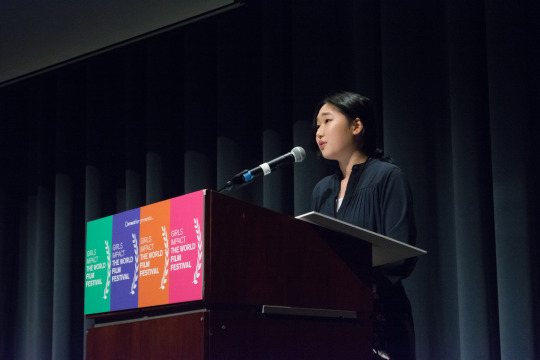
1. Your film Your Flowers Did Not Fade shares the heartbreaking stories of the now elderly Korean women who survived sex slavery at Japan’s World War II “comfort stations.” What inspired you to make this film?
I was actually planning to make a film about Greenpeace. But one of the environmental activists I interviewed worked in the care center for victims of Japanese sex slavery. After talking with her, I decided to visit a museum about this issue. Once I did, I felt a huge responsibility to tell their story to the world and keep it alive.
2. In addition to historical photographs and archival film interviews with the victims, your film incorporates shots of the modern-day protests at the Japanese embassy in Seoul. For 25 years, Koreans of all ages and backgrounds have gathered there to demand justice for their “grandmothers.” Did these protests provide an important context for your story?
One thing I know for sure is that the protesters are filled with energy to fight for this issue. It was so overwhelming and touching to be a part of the protests. Despite the fact that we didn't know each other, we became unified in that cause.
3. What was the biggest challenge you faced when making this film?
Conducting the research was a challenge. Before making this documentary, I knew very little about the comfort women. I wanted to make sure that my film told the story as accurately as possible.

4. Did your experience winning the Judges’ Choice Award at the Girls Impact the World Film Festival change you in any way?
I never would have thought that I would fly all the way to America to see my film being screened in front of people from all over the world. I'm so grateful that audiences were able to watch and be aware of this issue through Girls Impact the World Film Festival. I experienced how much power a film holds in spreading a message.
5. Do you have any plans for your next project?
I have not produced any other films since then. However, as a film major at Syracuse University, I am considering making a film based on Korea's #MeToo movement.
0 notes
Text
Q&A with filmmaker Gerardo Hernandez
Gerardo Torres Hernández, a computer engineering student at Universidad Autónoma Metropolitana in Mexico City, learned to code and develop his own video games at age 12. Two years ago he taught himself filmmaking and cinematography. His film Lucia won the People’s Choice Award at the 2019 Girls Impact the World Film Festival.
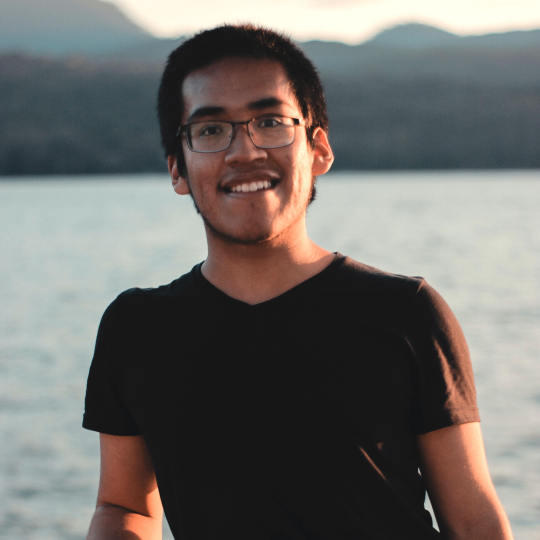
1. Lucia is a powerful film about a harsh reality in Mexico right now: violence against women. How did you decide to make a film about this subject?
In 2018 there was a surge in violence against women in Mexico. You could see every day in the news stories about woman being murdered, raped, kidnapped, tortured, being harassed by people in the street. If you had a mother, sister, girlfriend, aunt, or grandmother, you didn’t know what would happen. They could leave the house or their job and you could never see them again. One night I was out eating tacos with my friend Alfred, and the conversation turned to the Girls Impact the World Film Festival. We love making videos and films, but we didn’t have a good story. Then we realized that we had a great opportunity to write a script about the situation in our country.
2. Audiences loved the film, obviously, since it won the People's Choice Award. How have you shared the film, and how are audiences responding?
I edited the final version of the film at 2 AM, uploaded it to YouTube, and entered it in the Girls Impact the World Film Festival. A friend of mine shared it at 3 AM. The first day it was up, Lucia got nearly 2,000 views. A lot of people where sharing and tagging other friends. It was out of control!
Later, when we had reached 6,500 views, I asked some teachers at my old high school if we could screen the film there. The reaction of the audience was the most beautiful thing you can see as a director of a short film. In the most intense parts, people in the audience were talking about what was happening in the film, and at the end, some people cried. It was awesome, because I could see the result of three months of effort.
We reached a lot of people, and we truly hope that Lucía has impacted society in a good way!
3. Have you or do you plan to use the film to bring attention and action to this crisis of violence against women?
I think we have accomplished what we set out to do. Lucía has had almost 12,000 views. We appeared in the local news, and we had an interview appear in the national news. If we change the mindset of every person who watches the film, we are going in the right direction.
4. What was the biggest challenge you faced?
I think the biggest challenge was the limited resources we had when we were making the film. I liked photography and making videos for YouTube with my cellphone, but I couldn't afford to buy a DSLR camera. When I finished high school, one of my friend Alfred, and I had the idea to sell webpages and videos to little businesses in town. We bought a secondhand Canon t3i with our savings. Our first customer was Alfred’s aunt, who has a nonprofit organization about trees.
Later when we discovered Girls Impact the World Film Festival and decided to make Lucía, we already had some gear to produce the short film, but we were missing a lot of things, like an external audio recorder, a boom stick, SD cards, a clapperboard, cables for the recorder. We ran out of money quickly, but Alfred’s aunt lent us money. There was another problem: We didn't have money to pay the actors or crew. That is where Alfred shines. He started making calls to friends and family. We told potential actors that we could give them part of the prize if we won something.
So here we are, two young guys, 19 and 20, with no money, and we wanted to make a short film with horses, cars, kidnappings, rivers, cafeterias, bad guys, a lost apartment, a big city, and a remote town. How would we manage that? In the end, more than 60 people helped with the film directly or indirectly—friends, strangers, family, family that we didn't even know we had. One actor was a stranger who was drunk and passing by while we were shooting and said he wanted to participate.
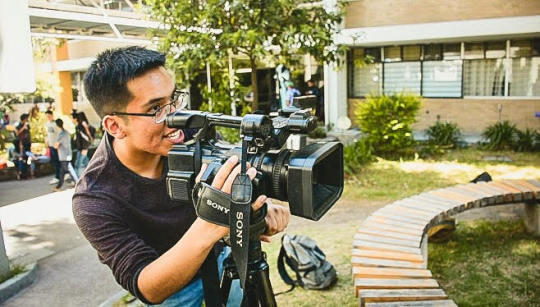
Editing was also difficult. The first cut of the film was 15 minutes long. We needed to cut it to 6 minutes for the competition without making the story seem forced. When the film was finished, I realized that it needed music, so I started composing the music. Fortunately, I studied classical guitar when I was 12 years old and knew a little bit of music theory.
The journey we made from Mexico to Texas to attend the film festival—well, that's another story. We had to travel to three cities in Mexico to get visas. Then we made a super low budget journey from Mexico, ha ha. You can find this story on my Facebook page, but I warn you, it’s long…
5. Is there anything else you'd like to share?
Yes! I want to say to everybody to try whatever they like to do, whatever it is. You can learn a lot of new things, you can have a really good time, and can meet a lot of awesome people! Also, if you would like to try something new, try filmmaking! I taught myself by making trailers of my video games for YouTube. It’s a unique and fun experience!

0 notes
Text
What are your favorite films about women and girls?

By Elaine Robbins
Here are my Top 3:
1. A Girl in the River. This harrowing Academy Award winning documentary directed by Sharmeen Obaid-Chinoy gives “honor killing” a name and a face. It tells the story of one girl who survived and spoke out after her own family members left her for dead.
2. Pray the Devil Back to Hell. This riveting documentary tells the story of how women in Liberia came together to force leaders to make a peace deal and end the country’s devastating civil war. It’s a primer on nonviolent disobedience based on the book “Mighty Be Our Powers” by Leymah Gbowee.
3. Working Girls. This highly entertaining girl-power film directed by the great Mike Nichols stars Melanie Griffith as a working-class girl who uses her smarts to get her big break at a Wall Street firm.
What are your faves? Share your thoughts below.
1 note
·
View note
Text
5 Ideas for Your Next Environmental Film for the Girls Impact the World Film Festival
By Elaine Robbins
Hey, filmmakers! Do you care passionately about an environmental issue that impacts women and girls? The Girls Impact the World Film Festival’s Green IS Environmental Film Award, sponsored by the Ian Somerhalder Foundation, offers a $2,500 prize to a short film that shines a light on an environmental issue that impacts women and girls—and considers solutions. Submit a film about one story or issue and spread the word!

Do these links spark any ideas?
1. How are women impacted by environmental issues, and what are they doing about it? Explore the issues here.
2. Check out how women are coping with environmental challenges around the globe here.
3. We love Project Drawdown, which ranks the top 100 climate solutions with the greatest impact.
4. Do you know a female environmental hero? Think Greta Thunberg, who launched the global climate school strikes. Or Wangari Maathai, who created Kenya’s Greenbelt Movement. Do these badass women environmental heroes spark any ideas about women working in your community?
5. More than half of the world’s population lives in cities—and that number is expected to rise to two-thirds by 2050. Here are some women who are making cities more sustainable.
Now it’s your turn! Write down 2 ideas for possible Green IS films and 3 ways you might tell each of these stories.
0 notes
Text
Congratulations to all winners! Thank you for celebrating with us at the St. Andrew’s Dell Fine Arts Theater in Austin, TX on April 14, 2019
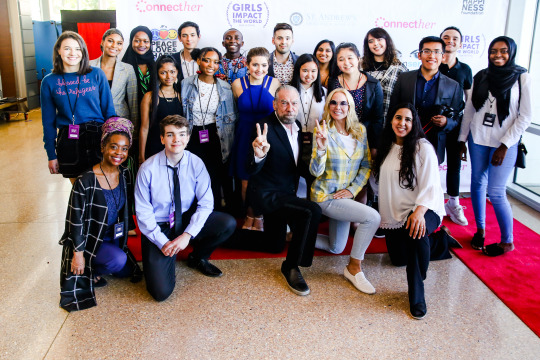
JUDGES CHOICE GRAND PRIZE WINNER ($5,000)
We Could be Champions Too
Novera Hasan Nikkon, Jagannath University, Bangladesh
JUDGE’S CHOICE FIRST RUNNER UP ($2,500)
Dignity
Rachel Deva Rani Dharmapalan, Oakland School for the Arts, USA
JUDGE’S CHOICE SECOND RUNNER UP ($1,000)
A Film for Gugu
Aida Namukose, African Leadership Academy, South Africa
PEOPLE’S CHOICE ($2,500)
Lucia
Gerardo Torres Hernandez, Universidad Autónoma Metropolitana, Mexico
Women in STEM ($,1000)
GEMS: Girls Empowered by Math and Science
Sadie Price-Elliott, Sussex County Technical School, USA
GLOBAL IMPACT ($2,500)
In Search Of Rekha Hasda
Hasanul Hoq , Abu Owazed Sah Showmik, Jagannath University, Bangladesh
HONEST BEAUTY ($2,500)
The Skin Tone Rule
Amanda Gordon, New York University, USA
BEST FILM PRODUCTION ($1,000)
A Heist of One’s Own
Pubali (Priya) Ghosh, Savannah College of Art and Design
LET GIRLS LEARN ($1,000)
Dilemma
Diana Senator Lyoto, Catholic university of health and allied sciences( CUHAS), Tanzania
ENDING VIOLENCE AGAINST WOMEN ($1,000)
Surviving Burns
Mallika Sehgal, FLAME University, India
GREEN IS: SPONSORED BY IAN SOMERHALDER FOUNDATION ($2,500)
What I Love Most
Nguyen Thi Kieu Oanh, Academy of Journalism and Communication, Vietnam
MOST INNOVATIVE SOLUTION ($1,000)
Aya’s Home
Aidan Ellis, St. Stephen’s Episcopal School, USA
STAND UP MEN ($2,500)
Stand Up Men
Emily Seshadri, University of London, UK
GEM’S CHOICE (2 WINNERS - $1,500)
Child Marriage Robbed Me Off My Childhood, but I Still Dream
Suzete Da Graça André, Eduardo Mondlane University, Mozambique
AND
She Matters
Suhayl Omar, Riara University, Kenya
0 notes
Photo

Here's your chance to dine with Nikki Reed and Ian Somerhalder! Help us get to $2,500!
0 notes